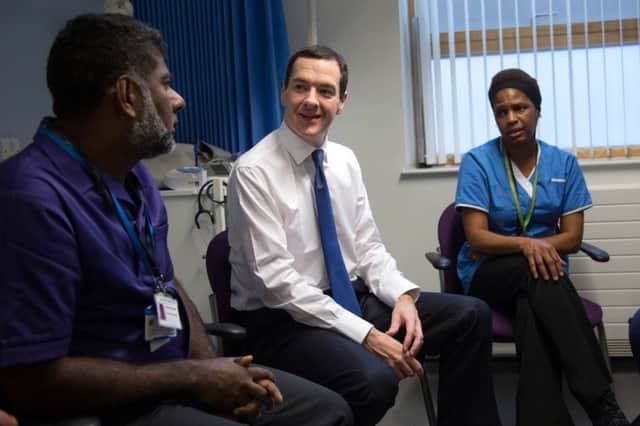Chancellor warned the UK is facing £30bn black hole


The warning was issued ahead of today’s Autumn Statement by the Centre for Economics and Business Research (CEBR), the leading economics consultancy.
It came up with the £30bn shortfall when it compared its own economic forecasts for the next few years with the Office for Budget Responsibility (OBR) figures used by the Chancellor.
Advertisement
Hide AdAdvertisement
Hide AdAccording to CEBR predictions, Mr Osborne will narrowly miss this year’s deficit target of £69.5bn, and will also fail in his goal to return the UK to a surplus in 2020.
Weaker-than-predicted growth will in fact mean that the UK remains in the red by £20.8bn in 2020, instead of the OBR’s forecast in July for a £10bn surplus, according to the Cebr.
And it believes the deficit will remain at £18.4bn in 2021, rather than the £11.6bn surplus predicted in July – effectively leaving Mr Osborne with a £30bn gap in the finances.
The Cebr said: “Because the Chancellor’s forecasts rely on an implausibly high rate of growth we think that the government’s fiscal position is much less favourable than was set out in the July Budget.
“The deficit will not be eliminated in the current parliament.”
It is predicting a more gloomy path for Britain’s economy over the next six years, forecasting that gross domestic product (GDP) will slow after 2015, from 2.6 per cent to as low as 1.6 per cent in 2018.
This is more pessimistic than the OBR forecasts announced at the time of the summer Budget in July, when it pencilled in growth of 2.4 per cent in 2017 and remaining at that level until 2020. The Cebr added: “As the economy slows after this year, the Chancellor will be forced to adjust his borrowing targets, cut spending by more or raise taxes – or some combination of the three. What he chooses is up to him.”
Experts widely believe the borrowing targets will be scaled back in today’s Autumn Statement, particularly after grim official figures on Friday showed borrowing increased to £8.2bn last month – the worst deficit for any October since 2009, the early years of the recession.
Advertisement
Hide AdAdvertisement
Hide AdThe Office for National Statistics data showed public sector net borrowing excluding banks was £1.1bn higher than in October last year.
So far in the financial year overall, public borrowing between April and October stood at £54.3bn, which is £6.6bn lower when compared with the same period last year.
But experts believe it will be an uphill struggle to keep borrowing within the £69.5bn target for the full-year.